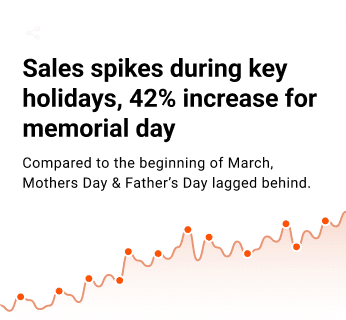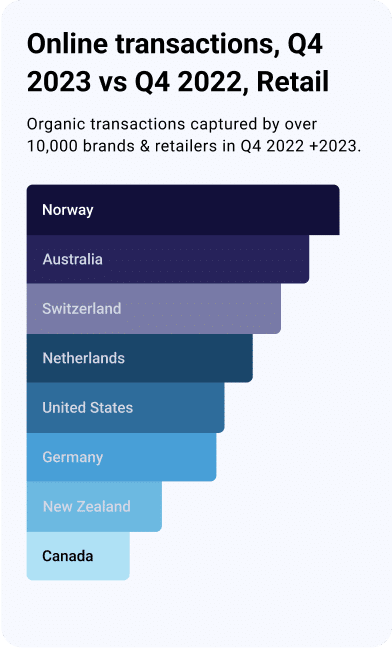NEW YORK—Nov. 29, 2017—Criteo S.A. (NASDAQ: CRTO), the commerce marketing technology company, today released its analysis of transactions reported by its US retail clients leading up to and during this year’s biggest holiday sales weekend. The data points to a staggering increase in buyers, mass merchants making inroads despite predictions otherwise and a boost in mobile purchases as consumers are driven to purchase on demand. However, come Cyber Monday the data shows that many of the same shoppers shift back to desktops as they return to work—highlighting the true omnishopper cycle of today’s modern customer.
Shoppers Come Out in Full Force
A significant spike in consumer shopping was fueled by a positive buying mood, strong economy and the deep discounts that shoppers have come to expect on Black Friday and Cyber Monday.
- In total, holiday shopper volumes increased 49 percent over the “baseline period” (November 6 through November 19, 2017) with the number of buyers jumping an incredible
112 percent overall.
- The largest increases in buyers took place on Black Friday (up 157 percent) and Cyber Monday (up 184 percent) from the weeks prior.
- Shopper volume also saw an increase over the same period, up 49 percent with the largest days being Cyber Monday (up 74 percent) and Black Friday (up 68 percent).
Mobile Shopping On-Demand
The sales period from what we’re calling “Black Thanksgiving” to Cyber Monday was especially intense, making the jump in weekend mobile sales share (40.6 percent of all sales) eye-opening but not a complete surprise. Rather, this underscores a fundamental consumer paradigm shift to purchase-on-demand habits.
Nearly all categories experienced an increase in the share of purchases from mobile devices during the five-day peak period in comparison to the baseline period, including Mass Merchants (up 7.4 percentage points), Toys and Gadgets (up 5.3 percentage points), Flowers and Gifts (up 3.5 percentage points), Home Improvement and Home Goods (up 3.4 percentage points), and Fashion and Luxury (up 0.7 percentage points). By contrast, Health and Beauty’s mobile share declined somewhat (down 1.1 percentage points). The top takeaways include:
- Mass Merchants showed a strong increase in mobile share, demonstrating physical storefronts and an investment in mobile site quality can translate into mobile commerce.
- Toy buyers are highly sensitive to specific inventory items, as kids rarely accept substitutes, and busy parents need to have flexibility to purchase how and when it’s convenient for them.
- A 3.5 percentage point increase in mobile share for the Flowers and Gifts vertical demonstrates that consumers are absorbing the “gifting” message and transacting away from home.
- For Home Improvement and Home Goods, consumers’ interest in specific inventory items, which might be out-of-stock or undiscounted in a given brand’s physical store, led consumers to consider other options while they were out of home.
- The fashion shopper continues to be highly predisposed towards mobile commerce. The combination of a younger, more mobile-savvy demographic combined with retailer investment in a high-quality mobile commerce experience allowed fashion retailers to take advantage of this trend.
Toys and Gadgets Win Shoppers Over
As Santa’s helpers gear up for the holiday season, it’s no surprise the Toys and Gadgets category saw the greatest average gain from both shoppers and buyers of any vertical.
- Over the five-day peak period there was an overall increase of 263 percent (shoppers) and 108 percent (buyers). These increases dwarf all other verticals.
Mass Merchants Fight Back
Mass Merchant retailers came in second behind Toys and Gadgets, with buyers increasing by 145 percent and shoppers by 88 percent—a sign that department stores are fighting for shoppers’ dollars with highly successful promotional strategies. When comparing Mass Merchants with standalone Fashion retailers, the data illustrates that Mass Merchants were able to better retain their baseline average order value (AOV) over the five-day period based on shoppers placing more items in their baskets given the deep discounts.
- Mass Merchants showed a strong increase in mobile share (+7.4ppts) as the physical presence of their stores and investment in mobile site quality helped translate into mobile commerce.
- Fashion retailers, by contrast, saw a drop in their average order value (AOV) over the five-day period of about 33 percent.
“The triple-digit jump in shopper volumes and positive strides made by mass merchants in this fiercely competitive landscape show us that retail is alive and well—but it has shifted,” said Jaysen Gillespie, Vice President, Head of Analytics and Data Science, Criteo. “Today’s retailers have to strategize far beyond discount structures to win during the holidays. Shoppers are savvy, considering everything from free shipping price cutoffs to ease of returns as they shop in stores and on their phones. The 2017 holiday season is not yet over and come January, we will have an even clearer vantage point into what it takes for retailers to survive and thrive.”
Methodology
- Criteo U.S. Retail Clients
- Excluded clients where a transaction does not represent spend of dollars, such as price comparison sites and lead generation sites
- Baseline period: November 6 – November 19, 2017
- Baseline was broken down into weekday and weekend days to understand mobile versus desktop behavior
- Device Type
- Used the user agent and the operating system to determine the device type
- Any in-app purchases were assigned to the mobile device category
- Fringe, non-desktop devices such as a Tesla screen are classified as mobile devices
About Criteo
Criteo (NASDAQ: CRTO), the leader in commerce marketing, is building the highest performing and open commerce marketing ecosystem to drive profits and sales for retailers and brands. More than 2,700 Criteo team members partner with 17,000 customers and thousands of publishers across the globe to deliver performance at scale by connecting shoppers to the things they need and love. Designed for commerce, Criteo’s Commerce Marketing Ecosystem sees over $550 billion in annual commerce sales data. For more information, please visit www.criteo.com.















